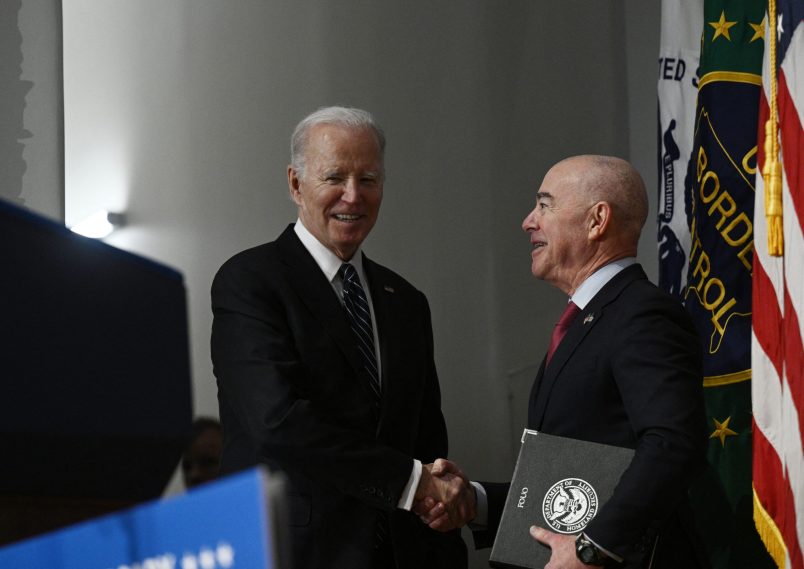The Supreme Court ruled Friday that Texas and Louisiana do not have standing to challenge Biden administration immigration guidelines, a surprising win for the administration from a Court that has been very hostile to executive branch agencies.
The red states were trying to challenge the Secretary of Homeland Security’s guidance that prioritizes certain undocumented immigrants for arrest and removal, including those suspected of terrorist activity. They claimed that they may have to pay extra costs downstream from that guidance, a result of potentially having to detain immigrants or provide them with services.
The government argued that letting states sue on such an indirect basis would let them “challenge virtually any federal policy by leveraging even a dollar’s worth of incidental, indirect effect on state expenditures into a nationwide vacatur or injunction.”
On Friday, the majority, led by Justice Brett Kavanaugh, agreed.
“The States’ novel standing argument, if accepted, would entail expansive judicial direction of the Department’s arrest policies,” he writes. “If the Court green-lighted this suit, we could anticipate complaints in future years about alleged Executive Branch under-enforcement of any similarly worded laws — whether they be drug laws, gun laws, obstruction of justice laws, or the like. We decline to start the Federal Judiciary down that uncharted path.”
Kavanaugh was joined in the majority opinion by Chief Justice John Roberts and Justices Sonia Sotomayor, Elena Kagan and Ketanji Brown Jackson. Justice Neil Gorsuch filed a concurring opinion, joined by Justices Clarence Thomas and Amy Coney Barrett, and Barrett wrote a concurrence joined by Gorsuch. Justice Samuel Alito dissented.
Gorsuch agrees that the states don’t have standing, but for a different reason than the majority (he has no problem with the very tenuous downstream effects giving the states standing). He writes that nothing the Court could do would meaningfully redress the states’ “harms.”
“A judicial decree rendering the Guidelines a nullity does nothing to change the fact that federal officials possess the same underlying prosecutorial discretion,” he writes. “Nor does such a decree require federal officials to change how they exercise that discretion in the Guidelines’ absence.”
In her concurrence, Barrett strikes similar notes, and expresses skepticism towards the majority’s standing arguments.
Alito, predictably, places his sympathies with “states already laboring under the effects of massive illegal immigration” that are now “even more helpless.” He uses his dissent to condemn the majority as less giving the executive usual enforcement discretion, and more throwing him a coronation.
“The majority’s conception of Presidential authority smacks of the powers that English monarchs claimed prior to the ‘Glorious Revolution’ of 1688, namely, the power to suspend the operation of existing statutes, and to grant dispensations from compliance with statutes,” he writes.
This case was another where right-wing litigants, in this case the states, used a judge shopping pipeline that has become ubiquitous in challenging administration actions. Donald Trump appointee Judge Drew Tipton, usually amenable to these suits, granted nationwide relief from the DHS policy. The case then went to the ultra-conservative Fifth Circuit Court of Appeals, which declined to stay the lower court opinion. The Supreme Court seemed ready to play along nearly a year ago, blocking the DHS guidance until the Court ruled months later.
Gorsuch, in his concurring opinion, rails against universal injunctions, a key tool that the Trumpy district court judges use to freeze administration policies. Gorsuch is a known opponent to the nationwide relief, and has written against it before — but it makes Thomas and Barrett’s joining in his opinion notable.
“Universal injunctions continue to intrude on powers reserved for the elected branches,” he writes. “They continue to deprive other lower courts of the chance to weigh in on important questions before this Court has to decide them. They continue to encourage parties to engage in forum shopping and circumvent rules governing class-wide relief.”
Read the opinion here:



